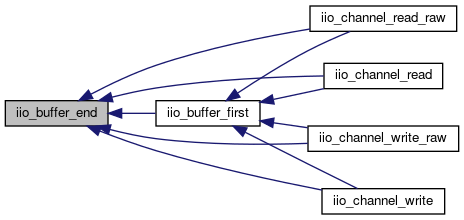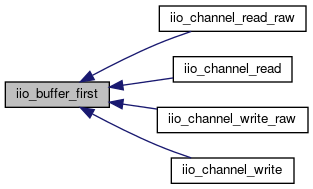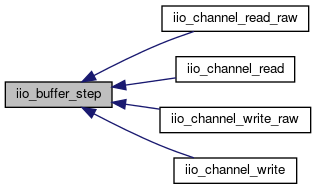Data Structures | |
| struct | iio_buffer |
| An input or output buffer, used to read or write samples. More... | |
Functions | |
| __api __pure const struct iio_device * | iio_buffer_get_device (const struct iio_buffer *buf) |
| Retrieve a pointer to the iio_device structure. More... | |
| __api struct iio_buffer * | iio_device_create_buffer (const struct iio_device *dev, size_t samples_count, bool cyclic) |
| Create an input or output buffer associated to the given device. More... | |
| __api void | iio_buffer_destroy (struct iio_buffer *buf) |
| Destroy the given buffer. More... | |
| __api int | iio_buffer_get_poll_fd (struct iio_buffer *buf) |
| Get a pollable file descriptor. More... | |
| __api int | iio_buffer_set_blocking_mode (struct iio_buffer *buf, bool blocking) |
| Make iio_buffer_refill() and iio_buffer_push() blocking or not. More... | |
| __api ssize_t | iio_buffer_refill (struct iio_buffer *buf) |
| Fetch more samples from the hardware. More... | |
| __api ssize_t | iio_buffer_push (struct iio_buffer *buf) |
| Send the samples to the hardware. More... | |
| __api ssize_t | iio_buffer_push_partial (struct iio_buffer *buf, size_t samples_count) |
| Send a given number of samples to the hardware. More... | |
| __api void | iio_buffer_cancel (struct iio_buffer *buf) |
| Cancel all buffer operations. More... | |
| __api void * | iio_buffer_start (const struct iio_buffer *buf) |
| Get the start address of the buffer. More... | |
| __api void * | iio_buffer_first (const struct iio_buffer *buf, const struct iio_channel *chn) |
| Find the first sample of a channel in a buffer. More... | |
| __api ptrdiff_t | iio_buffer_step (const struct iio_buffer *buf) |
| Get the step size between two samples of one channel. More... | |
| __api void * | iio_buffer_end (const struct iio_buffer *buf) |
| Get the address that follows the last sample in a buffer. More... | |
| __api ssize_t | iio_buffer_foreach_sample (struct iio_buffer *buf, ssize_t(*callback)(const struct iio_channel *chn, void *src, size_t bytes, void *d), void *data) |
| Call the supplied callback for each sample found in a buffer. More... | |
| __api void | iio_buffer_set_data (struct iio_buffer *buf, void *data) |
| Associate a pointer to an iio_buffer structure. More... | |
| __api void * | iio_buffer_get_data (const struct iio_buffer *buf) |
| Retrieve a previously associated pointer of an iio_buffer structure. More... | |
Detailed Description
Function Documentation
◆ iio_buffer_cancel()
| __api void iio_buffer_cancel | ( | struct iio_buffer * | buf | ) |
Cancel all buffer operations.
- Parameters
-
buf The buffer for which operations should be canceled
This function cancels all outstanding buffer operations previously scheduled. This means any pending iio_buffer_push() or iio_buffer_refill() operation will abort and return immediately, any further invocations of these functions on the same buffer will return immediately with an error.
Usually iio_buffer_push() and iio_buffer_refill() will block until either all data has been transferred or a timeout occurs. This can depending on the configuration take a significant amount of time. iio_buffer_cancel() is useful to bypass these conditions if the buffer operation is supposed to be stopped in response to an external event (e.g. user input).
To be able to capture additional data after calling this function the buffer should be destroyed and then re-created.
This function can be called multiple times for the same buffer, but all but the first invocation will be without additional effect.
This function is thread-safe, but not signal-safe, i.e. it must not be called from a signal handler.
◆ iio_buffer_destroy()
| __api void iio_buffer_destroy | ( | struct iio_buffer * | buf | ) |
Destroy the given buffer.
- Parameters
-
buf A pointer to an iio_buffer structure
NOTE: After that function, the iio_buffer pointer shall be invalid.
◆ iio_buffer_end()
| __api void* iio_buffer_end | ( | const struct iio_buffer * | buf | ) |
Get the address that follows the last sample in a buffer.
- Parameters
-
buf A pointer to an iio_buffer structure
- Returns
- A pointer corresponding to the address that follows the last sample present in the buffer

◆ iio_buffer_first()
| __api void* iio_buffer_first | ( | const struct iio_buffer * | buf, |
| const struct iio_channel * | chn | ||
| ) |
Find the first sample of a channel in a buffer.
- Parameters
-
buf A pointer to an iio_buffer structure chn A pointer to an iio_channel structure
- Returns
- A pointer to the first sample found, or to the end of the buffer if no sample for the given channel is present in the buffer
NOTE: This function, coupled with iio_buffer_step and iio_buffer_end, can be used to iterate on all the samples of a given channel present in the buffer, doing the following:
for (void *ptr = iio_buffer_first(buffer, chn); ptr < iio_buffer_end(buffer); ptr += iio_buffer_step(buffer)) {
....
}


◆ iio_buffer_foreach_sample()
| __api ssize_t iio_buffer_foreach_sample | ( | struct iio_buffer * | buf, |
| ssize_t(*)(const struct iio_channel *chn, void *src, size_t bytes, void *d) | callback, | ||
| void * | data | ||
| ) |
Call the supplied callback for each sample found in a buffer.
- Parameters
-
buf A pointer to an iio_buffer structure callback A pointer to a function to call for each sample found data A user-specified pointer that will be passed to the callback
- Returns
- number of bytes processed.
NOTE: The callback receives four arguments:
- A pointer to the iio_channel structure corresponding to the sample,
- A pointer to the sample itself,
- The length of the sample in bytes,
- The user-specified pointer passed to iio_buffer_foreach_sample.

◆ iio_buffer_get_data()
| __api void* iio_buffer_get_data | ( | const struct iio_buffer * | buf | ) |
Retrieve a previously associated pointer of an iio_buffer structure.
- Parameters
-
buf A pointer to an iio_buffer structure
- Returns
- The pointer previously associated if present, or NULL
◆ iio_buffer_get_device()
| __api __pure const struct iio_device* iio_buffer_get_device | ( | const struct iio_buffer * | buf | ) |
Retrieve a pointer to the iio_device structure.
- Parameters
-
buf A pointer to an iio_buffer structure
- Returns
- A pointer to an iio_device structure
◆ iio_buffer_get_poll_fd()
| __api int iio_buffer_get_poll_fd | ( | struct iio_buffer * | buf | ) |
Get a pollable file descriptor.
Can be used to know when iio_buffer_refill() or iio_buffer_push() can be called
- Parameters
-
buf A pointer to an iio_buffer structure
- Returns
- On success, valid file descriptor
- On error, a negative errno code is returned
◆ iio_buffer_push()
| __api ssize_t iio_buffer_push | ( | struct iio_buffer * | buf | ) |
Send the samples to the hardware.
- Parameters
-
buf A pointer to an iio_buffer structure
- Returns
- On success, the number of bytes written is returned
- On error, a negative errno code is returned
NOTE: Only valid for output buffers

◆ iio_buffer_push_partial()
| __api ssize_t iio_buffer_push_partial | ( | struct iio_buffer * | buf, |
| size_t | samples_count | ||
| ) |
Send a given number of samples to the hardware.
- Parameters
-
buf A pointer to an iio_buffer structure samples_count The number of samples to submit
- Returns
- On success, the number of bytes written is returned
- On error, a negative errno code is returned
NOTE: Only valid for output buffers

◆ iio_buffer_refill()
| __api ssize_t iio_buffer_refill | ( | struct iio_buffer * | buf | ) |
Fetch more samples from the hardware.
- Parameters
-
buf A pointer to an iio_buffer structure
- Returns
- On success, the number of bytes read is returned
- On error, a negative errno code is returned
NOTE: Only valid for input buffers
◆ iio_buffer_set_blocking_mode()
| __api int iio_buffer_set_blocking_mode | ( | struct iio_buffer * | buf, |
| bool | blocking | ||
| ) |
Make iio_buffer_refill() and iio_buffer_push() blocking or not.
After this function has been called with blocking == false, iio_buffer_refill() and iio_buffer_push() will return -EAGAIN if no data is ready. A device is blocking by default.
- Parameters
-
buf A pointer to an iio_buffer structure blocking true if the buffer API should be blocking, else false
- Returns
- On success, 0
- On error, a negative errno code is returned
◆ iio_buffer_set_data()
| __api void iio_buffer_set_data | ( | struct iio_buffer * | buf, |
| void * | data | ||
| ) |
Associate a pointer to an iio_buffer structure.
- Parameters
-
buf A pointer to an iio_buffer structure data The pointer to be associated
◆ iio_buffer_start()
| __api void* iio_buffer_start | ( | const struct iio_buffer * | buf | ) |
Get the start address of the buffer.
- Parameters
-
buf A pointer to an iio_buffer structure
- Returns
- A pointer corresponding to the start address of the buffer
◆ iio_buffer_step()
| __api ptrdiff_t iio_buffer_step | ( | const struct iio_buffer * | buf | ) |
Get the step size between two samples of one channel.
- Parameters
-
buf A pointer to an iio_buffer structure
- Returns
- the difference between the addresses of two consecutive samples of one same channel

◆ iio_device_create_buffer()
| __api struct iio_buffer* iio_device_create_buffer | ( | const struct iio_device * | dev, |
| size_t | samples_count, | ||
| bool | cyclic | ||
| ) |
Create an input or output buffer associated to the given device.
- Parameters
-
dev A pointer to an iio_device structure samples_count The number of samples that the buffer should contain cyclic If True, enable cyclic mode
- Returns
- On success, a pointer to an iio_buffer structure
- On error, NULL is returned, and errno is set to the error code
NOTE: Channels that have to be written to / read from must be enabled before creating the buffer.

 1.8.13
1.8.13